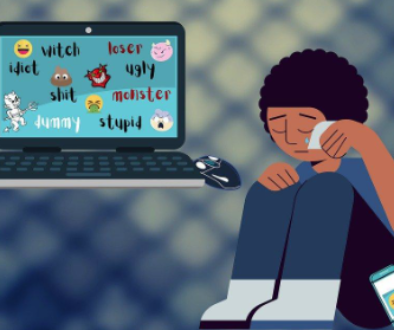The Warning Signs of Cyberbullying

Do you know that 95% of teenagers are connected to the Internet, while 85% have social media accounts? As the number of mobile devices connected to the web increases, so do the incidents of online abuse (or cyberbullying). Recent statistics are quite alarming. 60% of teenagers have experienced some form of online abuse in their life.
What makes it more alarming for parents is that most children do not report their experiences to them and suffer from them silently. Most children think that sharing their experiences will invoke an angry response from their children. Others fear that they may be forced to stop using mobile devices or disconnect from their social media accounts.
As a parent, if you are concerned about cyberbullying, you can look for some warning signs from your child. Early detection can help you to control or rectify the situation before it becomes a major issue.
In this article, we shall look at 10 warning signs that are an indication of cyberbullying:
-
Loss of interest in school and social life
This is a common warning sign from children who have suffered from a cyberbullying experience. They either refuse (or show little enthusiasm) in going to school – or in participating in social events. They even stay at home or don’t want to meet their friends as before. Other warning signs include avoiding any group gatherings and a lack of interest in sports and extracurricular activities.
-
Frustration with mobile phones
Cyberbullied children also seem very frustrated or anxious about using their mobile phones, tablets, or personal laptops. They could also display nervousness when texting or using their social media accounts. Another warning sign is when they suddenly stop what they are doing on their laptop (or hide the device) when you enter their room. They could also be spending more time (than usual) on their mobile phones – or completely stop using these devices. These extreme reactions can stem from their fear or anxiety about using technology.
-
Anger or frustration with the online web
Do you see your child constantly getting angry or frustrated after playing an online game – and see them forcibly shut down their device or throw their mobile phone away? This could be a warning sign of your child being cyberbullied on a gaming app or platform. Constant anger and frustration are their way of dealing with online abuse or cyberbullying.
-
Secrecy about sharing their online information
Has your child grown more secretive about their online profile or account information? That could be a warning sign of online abuse. When asked, victimized children will hesitate to divulge their online activities. They could also become afraid of sharing their account passwords or even their mobile phones with you. This could indicate that they are hiding something important from you.
-
Sudden change in sleep pattern
Is your kid suddenly losing sleep or sleeping more than normal? Then it could be a sign of cyberbullying. Online abuse creates nervous energy and restlessness in children, thus leading to disturbance in their sleep patterns. Even when sleeping, you could notice your child having “disturbed” sleep. Sleep-related fatigue can also hamper their daily activities.
-
Health-related problems
Besides mental issues like anxiety or depression, abused children can also develop health-related problems in a short period. For instance, you could see a sudden gain (or loss) in your child’s weight. Other signs include eating problems, constant headaches, or stomach aches. These physical symptoms are induced by emotional stress and depression.
-
Statements about suicide
If your child is passing comments about suicide, it’s a red flag that your child could be suffering from extreme depression. When your child shows such warning signs, it’s time for you to take immediate action and talk to them about it. Find out the reason why they are talking about suicide – and try to talk them out of considering such a drastic step.
-
Drop in academic grades
Do you see your child consistently performing poorly in their academic studies? Have their grades dropped suddenly in recent times? Yes, then it’s a sign that they are unable to focus on their academic pursuits and are worried about something else. Talk to their teachers and find out if they are noticing the same problems in your child. Besides academics, cyberbullied children can also lose interest in academic projects, extracurricular activities, and classroom work.
-
Loss of interest in hobbies or fun activities
If your child has lost interest in their favorite hobby or any fun activity, then it’s a sign that there’s something wrong with them. Do you see them losing complete interest in any fun-filled activity? If yes, they could be going through sadness or even depression. As a parent, give them ample hints that they can talk about their problem with you at any time.
-
Withdrawal from close friends and family
Your child could be a victim of cyberbullying if you find them withdrawn from other family members or even their closest friends. Your child could be hearing constant complaints (or missed calls) from their friends. This behavior is their way of responding to being humiliated – and trying to maintain a distance from their closest acquaintances. You should try to talk to them if this behavior continues for an extended period.
Conclusion
If you are concerned about cyberbullying, you should watch out for any of these 10 warning signs from your child. As a parent, you are the best judge of your child’s normal behavior – and detect any sudden changes. A victimized child or teenager is unable to understand their behavior – and prefers to not talk to you about their problems.
As a concerned parent, you can play a comforting role and encourage your child to open up to you. Once you know the root cause, you can then think of ways of dealing with cyberbullying.



